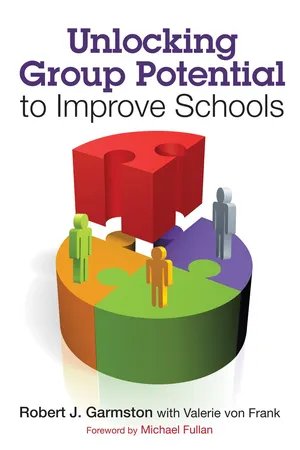
- 280 pages
- English
- ePUB (mobile friendly)
- Available on iOS & Android
Unlocking Group Potential to Improve Schools
About this book
How great groups make great schools
Training leaders how to conduct effective meetings is important, but it?s not enough to ensure that the professional development process is valuable. This field book shows educators how to develop group culture, enhance facilitators? skills, and optimize the group?s most precious resource—its members. The authors describe how to form working committees, task forces, grade-level, and department teams, and faculties that are more effective and better equipped to resolve complex issues around student learning. Specific topics include
- Understanding eight principles that underlie effective groups
- Learning the five standards for effective meetings
- Setting clear goals and roles
- Practicing new ways of talking for improved collaboration
- Examining perceptions and mental models
- Enhancing energy sources
- Working with conflict
- Developing basic facilitation skills
This practical guide?s special features include the newly updated seven norms of collaboration, a sample team assessment survey, instruments for assessing meeting effectiveness, an extensive bibliography, and practical examples embedded throughout the text. Practitioners will find a valuable road map for leading effective, student-focused school improvement efforts.
Frequently asked questions
- Essential is ideal for learners and professionals who enjoy exploring a wide range of subjects. Access the Essential Library with 800,000+ trusted titles and best-sellers across business, personal growth, and the humanities. Includes unlimited reading time and Standard Read Aloud voice.
- Complete: Perfect for advanced learners and researchers needing full, unrestricted access. Unlock 1.4M+ books across hundreds of subjects, including academic and specialized titles. The Complete Plan also includes advanced features like Premium Read Aloud and Research Assistant.
Please note we cannot support devices running on iOS 13 and Android 7 or earlier. Learn more about using the app.
Information
Table of contents
- Cover Page
- Title
- Copyright
- Contents
- Foreword
- Preface
- Acknowledgments
- About the Authors
- Introduction
- SECTION I: Getting Work Done
- SECTION II: Developing Collaborative Communities
- SECTION III: Developing a Sense of Community
- SECTION IV: Developing Facilitation Skills
- Conclusion
- Appendixes
- References
- Index